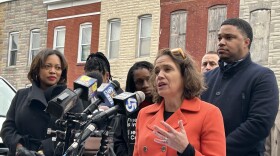Construction is already underway on the 700 block of Mura Street in East Baltimore.
Crews were visible — although in the background — as developers, city officials, and neighbors gathered Wednesday for a news conference to share what’s next for the block.
For Vere Edwards, the moment felt surreal.
He moved into Johnston Square back in 2005.
Since then, the avid gardener has poured his energy into the Mura Street community garden — nurturing plants while hoping the surrounding houses might one day bloom, too.
“I didn't see this day coming,” he confessed at a podium. “‘I’m thankful. I had faith. And so we kept faith. And I kept faith.”
Now, that faith is finally taking root.
The $5.5 million project, led by ReBUILD Metro, will reconfigure 23 existing houses into 10 new, for-sale units. The redesign will reduce crowding and add more parking space.
“Obviously, the state is a huge funder on this,” said Sean Closkey, president of ReBUILD Metro. “The Weinberg Foundation, the Goldseker Foundation, the Abell Foundation, Robert W Deutsch Foundation, have made sure we can do the hard work that's needed.”
Despite tariffs imposed under President Donald Trump, developers say they’re on track. By pre-purchasing materials like lumber, they expect to stay within budget.
Construction is slated to wrap in about 18 months.

The push for Mura Street’s revitalization began in neighborhood meetings in 2013.
Regina Hammond, executive director of the Rebuild Johnston Square Neighborhood Organization, said one persistent resident spearheaded the idea.
“She was constantly in our ear, asking ‘What about Mura Street?’” Hammond recalled.The group applied for grants and used the proceeds to paint boarded-up homes to “cover up the ugly,” while believing bigger change would come.
“We had to make it look a little better,” Hammond said. “Because we knew — some way, somehow — our prayer was going to get answered, and this neighborhood was going to be revitalized.”
Local officials, including some who grew up in the area, echoed that sentiment. The small alley homes were once starter houses for Baltimore families.
Now, they say, the updated units will preserve that legacy while welcoming a new generation of homeowners.

















